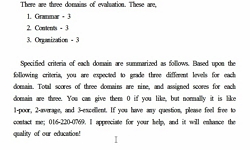This paper explores a rhetorical move, ‘establishing a niche,’ in the introduction and literature review sections of the Applied Linguistics research articles (RAs) in English written by Korean EFL postgraduates, compared with English and Korean R...
http://chineseinput.net/에서 pinyin(병음)방식으로 중국어를 변환할 수 있습니다.
변환된 중국어를 복사하여 사용하시면 됩니다.
- 中文 을 입력하시려면 zhongwen을 입력하시고 space를누르시면됩니다.
- 北京 을 입력하시려면 beijing을 입력하시고 space를 누르시면 됩니다.

Corpus-based Genre Analysis of Establishing a Niche in Korean EFL Postgraduate Students’ Research Articles
한글로보기https://www.riss.kr/link?id=A100461049
- 저자
- 발행기관
- 학술지명
- 권호사항
-
발행연도
2014
-
작성언어
English
- 주제어
-
등재정보
KCI등재
-
자료형태
학술저널
- 발행기관 URL
-
수록면
33-66(34쪽)
- 제공처
- 소장기관
-
0
상세조회 -
0
다운로드
부가정보
다국어 초록 (Multilingual Abstract)
This paper explores a rhetorical move, ‘establishing a niche,’ in the introduction and literature review sections of the Applied Linguistics research articles (RAs) in English written by Korean EFL postgraduates, compared with English and Korean RAs written by L1 scholars, respectively. The analysis of niche establishment (NE) with a framework adapted from the Swales’ CARS model revealed that Korean EFL postgraduates shared an understanding of the genre?specific functions of the two sections with the English and Korean L1 scholars: the high frequency of NEs in the introductions, preference of gap?indication as an NE strategy in the introductions including as the first NE step, a relatively large percentage following tradition in the literature reviews, and dominance of review of existing research prior to NE steps. However, they did not establish a niche and elaborate NEs consecutively as frequently as the English L1 scholars. Like the Korean L1 scholars, Korean EFL postgraduates favored the following of tradition in the literature reviews and often stated local educational problems. The results suggest the Korean EFL postgraduates’ NE strategies are attributable to the impact of RA languages and genre?specific features, L1 traits, and RA roles in the academic community of the field.
목차 (Table of Contents)
- I. INTRODUCTION
- II. NICHE ESTABLISHMENT IN ACADEMIC JOURNAL ARTICLES
- III. RESEARCH METHODOLOGY
- IV. RESULTS AND DISCUSSION
- V. CONCLUSION
- I. INTRODUCTION
- II. NICHE ESTABLISHMENT IN ACADEMIC JOURNAL ARTICLES
- III. RESEARCH METHODOLOGY
- IV. RESULTS AND DISCUSSION
- V. CONCLUSION
- REFERENCES
동일학술지(권/호) 다른 논문
-
- 한국응용언어학회
- Hyeyoung Cho
- 2014
- KCI등재
-
College Students’ Identity Negotiation Through Teacher Feedback and Revision in EFL Writing
- 한국응용언어학회
- Myung?Hye Huh
- 2014
- KCI등재
-
Cognitive Correlates of Complexity, Accuracy, and Fluency in L2 Spoken and Written Production
- 한국응용언어학회
- Youngjoo Kim
- 2014
- KCI등재
-
Working Memory and a Subject-object Asymmetry in L2 Processing of English Long-distance Wh-questions
- 한국응용언어학회
- Jin?Hwa Lee
- 2014
- KCI등재




 DBpia
DBpia




